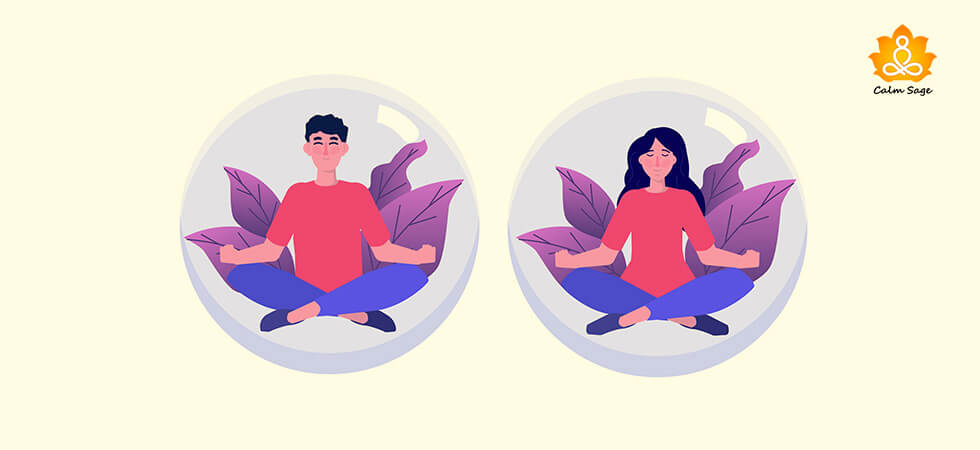An Introvert’s Guide To Managing Stress

Introverts are often misunderstood which makes others think that we dislike people and that we prefer to be alone – all the time. The truth – we don’t dislike people, we like people! We don’t want to be alone, we prefer the company of the people we love and trust.
Introverts experience stress just like an extrovert or an ambivert would. There are different ways introverts experience anxiety and stress depending on their situation. In some situations, our stress can be more overwhelming than that of extroverts.
Introverts and people with high sensitivity process and feel emotions (positive and negative) deeply.
Are You An Introvert Or An Extrovert?

If you’re someone who feels confident and likes being the center of attention in social situations, then you might be an extrovert. Extroverts tend to be dominant, social, and find peace when surrounded by others. Quite energetic, extroverts like spending time away from their comfort zone.
Introverts, on the other hand, tend to be more reserved and quiet. Not always wanting to be the center of attention, they like to spend time with their close friends and family rather than be in the company of others. If you’re someone who is more comfortable staying home and relaxing with your pet or book than other people, you might be an introvert.
There is a third category – Ambiverts. Ambiverts are a combination of an extrovert and an introvert. If you like spending time with other people but for a limited time or if you feel energetic but prefer to engage in an indoor activity than going out, you might be considered an ambivert. Not like being the center of attention at times but step up and speak when need be, ambiverts often fall on either side of the introvert/extrovert spectrum.
If you’re an extrovert, you can manage stress by:
1. Participating in a social activity:
Since extroverts don’t mind the company of others, participating in a social engagement can help them. For instance, participating in a sports activity can be great stress relievers.
2. Creating a support system:
Extroverts don’t mind seeking help and support from others so creating a supportive environment and network to engage in during stressful situations can be helpful.
3. Getting involved:
Extroverts can manage stress by getting involved in events like a community event, going out with friends, attending a music event, and such.
Stress Management Techniques For Introverts
The “Big Five” personality test research has found that people who lean more toward the introversion side of the spectrum tend to face more difficulties in managing stress and anxiety than people who fall on the extroversion spectrum.
There is a difference between how an introvert lives their life and how an extrovert lives theirs. Introverts are more likely to benefit from activities that are of a reserved nature.
The following techniques can be useful for introverts as well as ambiverts:
1. Meditation

Meditation is a powerful and effective way to fight stress. Practicing regular meditation can improve the resilience power that helps you fight stress. It can help you stay relaxed and by practicing mindfulness meditation, you can learn to stay in the moment while under a stressful situation. Meditation can be done indoors and from the comfort of your home.
Bonus: You can practice pet meditation, music meditation, nature meditation, and many more!
2. Journaling

Penning your thoughts in a journal is another effective way to manage stress. Maintaining a journal – gratitude, self-reflection, or emotion-focused journal – can help you understand the stressor and give you an understanding of your feelings and thought process.
3. Self-Talk
Extroverts, being energetic and positive in their thinking might not benefit from self-talk than introverts who are more likely to focus on the negative ones. It is important to understand the negative thoughts and their roots but these thoughts can increase the stress. Changing the thinking pattern from negative to positive can help an introvert feel better about themselves.
4. Home Organization
Introverts LOVE their space and comfort zone. By being in their “happy place”, introverts can recharge after socializing to their limit. If your home is cluttered and messy, handling stress might become difficult as a chaotic space is more likely to increase your stress. Cleaning and organizing your home, your happy place can go a long way to help you manage your stress.
Imagine coming home from a long day at work to an organized, decluttered, and clean space – sounds relaxing, doesn’t it?
5. Setting Boundaries
Many introverts fall prey to “peer pressure” and they think they need to be more extroverted. While being extroverted isn’t a bad thing, forcing yourself to become an extrovert can make you unhappy and uncomfortable in your own skin. It is important to remember to set some boundaries when it comes to socializing beyond what makes you comfortable and happy.
Uncomfortable and unfamiliar situations can increase your stress. Set boundaries and respect them. It is normal for you to take some time off to recharge.
6. Self-Compassion

Embrace your uniqueness! We all have our individuality and accepting them to yourself first and foremost is important. Practice self-compassion and learn to forgive yourself when necessary. Remember, you are human, and taking care of yourself, being gentle with yourself is a very effective way to beat those stressors.
To become more self-compassionate, practice loving-kindness meditation. Take care of yourself and love yourself as you do others.
On A Personal Note
Introverts are more likely to “pretend” to be happy when inside they are hiding their true feelings. Introverts are reserved and quiet and are more likely to suffer in silence than their counterparts.
While there are many stress relief activities available for extroverts, introverts don’t fare the same. We introverts tend to stay comfortable in our “happy place” rather than go out and hang out in the company of others.
Activities such as mindfulness meditation, LKM, journaling, and self-talk can help us introverts in better ways than it would help extroverts. With the right focus on our strengths, finding the right balance with the right stress management techniques, introverts can feel better in control in managing stress and staying resilient.
“Don’t think of introversion as something that needs to be cured…Spend your free the way you like, not the way you think you’re supposed to.” – Susan Cain
Be happy, be you!





















Finding the right balance is very important. Nicely explained.